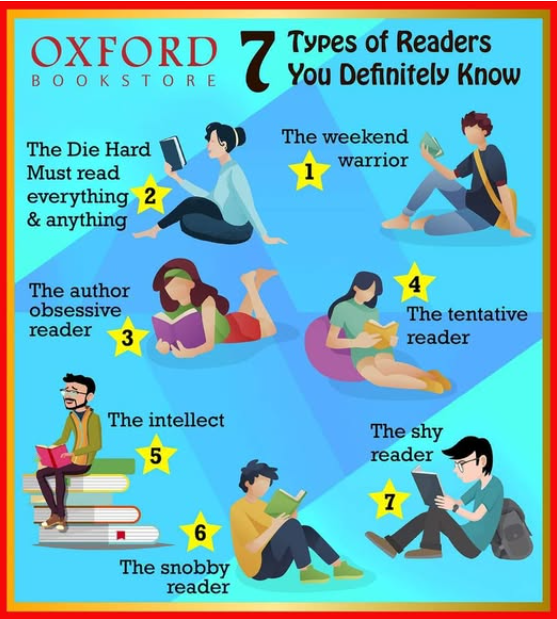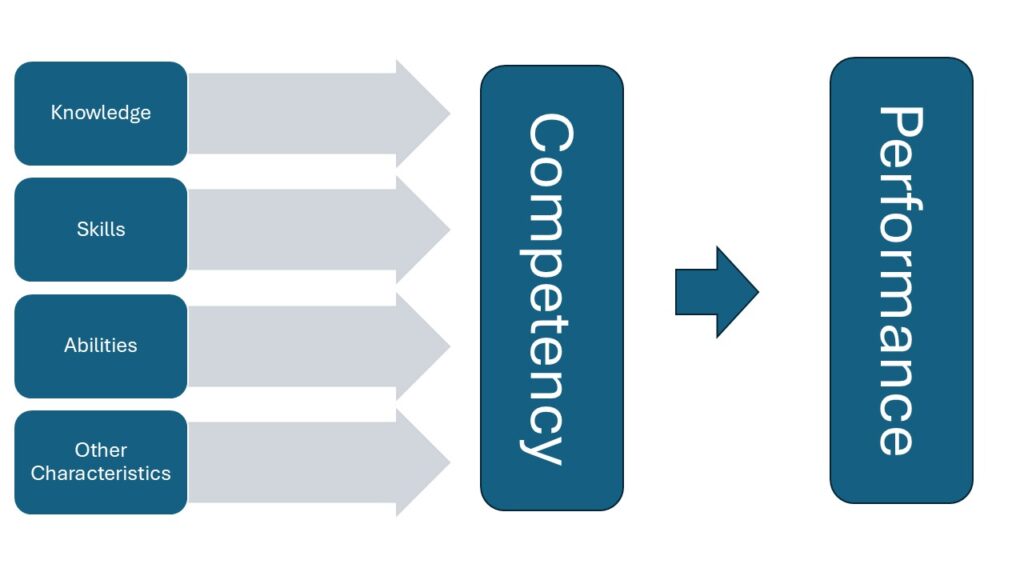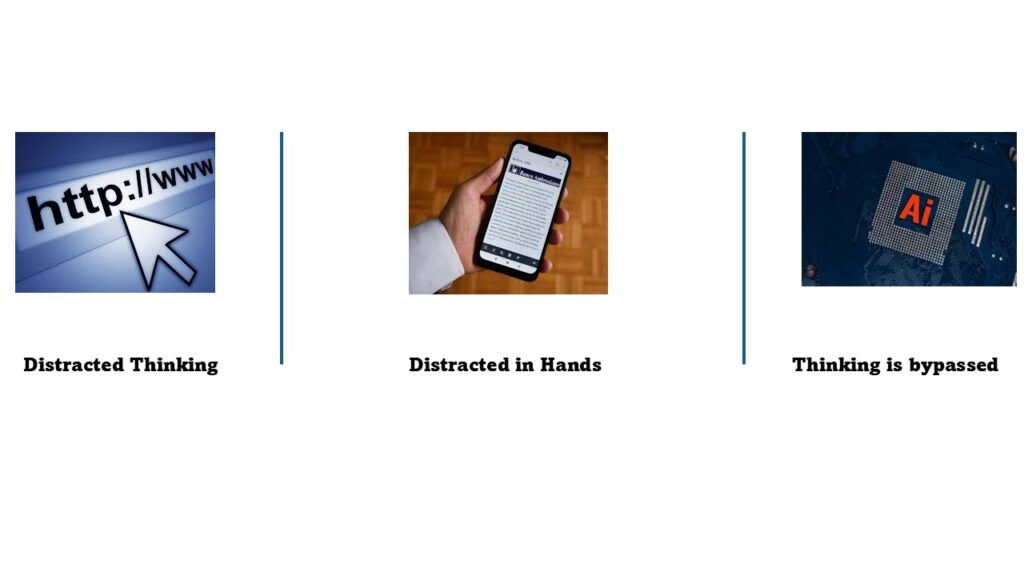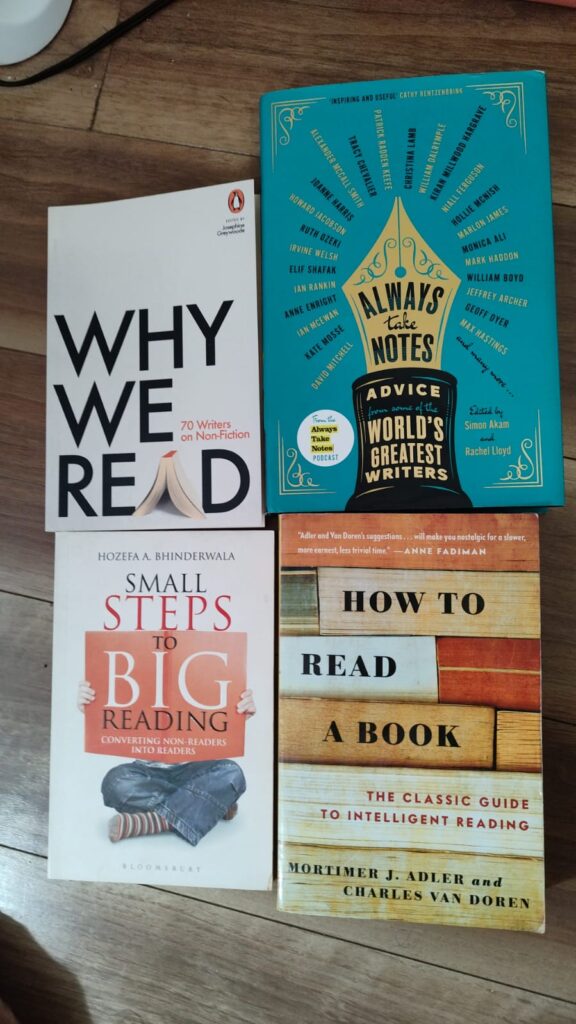People read.
People read anything and everything.
I like such people who read.
It’s like one addict finding another addict. I hunt for readers.
I hang out with them, form their WhatsApp groups, and chat with them.
Read a lot, and read nothing.

Readers come in all sizes, shapes, and styles.
Some just don’t read at all.
They buy books, visit libraries, and join book clubs, but they don’t read.
Then, some are slow readers.
They move to the next book at a snail’s pace.
Some are distracted readers.
(Like ADHD, we need a category for them).
They keep on shuffling with multiple books and create their own Tsudonku.
Some are fast readers.
Their speed intimidates.
They may read a book a night or a day.
Nilkanth – a fellow reader – easily reads 50 to 60 books a year.
Soni-Shaw posted about her 50 and 100 books story recently.
I read about the reader who reads 400+ books a year. (No, that “400” is not a Typo).
What kind of reader are you?
—-
But there is one type of reader that I want to become.
And I want every one of you to be that kind of reader.
That is a competent reader. Competent readers are competent learners.
(Competency is a technical term in HR and OB, and I am using it in that sense.)
—-
Competent readers and learners are a different breed.
They may be slow readers, fast readers, or distracted readers.
They are passionate readers.
They read for a purpose, for an objective, for a goal.
They read for leisure too.
They are book lovers.
Lovers that you not only want to hang around but also be with throughout life.
This post, a labor of love, is for these lovers, these competent readers.
This post will tell you what competency is and what a competent reader is.
What are the underlying building blocks and key points of a competent reader?
And finally, how to become one!
Stay tuned.
Need to know
What is competency,
Skill is not the same as competency.
Competency is a technical term, has a long history, a lot of research, and practice in OB-HR
Do look at this brief video of Danny Macaskill to get a glimpse of how competency looks in practice. (7-minute video, but just 3 to 4 minutes are good enough)
(Caution: Don’t try this!)
.
You have been cycling since primary school, but are you competent?
Whether you’re a fast or slow rider, a daily commuter or an occasional cyclist—whether you ride to work, for work, for leisure, sport, or exercise—the real question is: are you truly competent in using your bicycle?
You’ve been reading since your school days, but have you ever paused to consider—how competent a reader have you truly become?
Reading is a skill that you learn in school.
Reading is a skill that you continue using in college, in the work, or as a hobby in leisure.
But, reading becomes competency when you give it context. When you give it environment and show what your “abilities” are. Show what you can make from that reading.
When you bring knowledge, skills, and behaviors to reading, it starts becoming competency.
When your personality, attitude, and values (Other characteristics) support reading, it becomes competency.
When reading is a skill, you know how to read words, sentences, paragraphs, essays, long-form, and a book, too. This is what you were doing in school and college.
When reading is a competency, your words become terms, concepts, and jargon. Sentences become quotes, claims, minutes, and references. Paragraphs become statements, emails, arguments. Essays become ideas, proposals, reports, and monographs. This is what you are doing in workplace.
As a competency, reading skill reflects the way you think, the way you work, and the way you communicate. One sine qua non of quality of competency is its tight linkage with performance. As a competency, reading becomes the building block, a brick in your performance. The stronger, better, and sturdier the brick is better the building is. You will be better at the job. You will do better in your career. Your standing in the world is your performance. Everything flows from performance – earnings, bonuses, incentives, awards, name, and fame. Everything.
Think about Shashi Tharoor, Bill Gates, and Elon Musk as competent readers. Think about how their reading competency has shaped their performance. You will realize how competency separates average from high performers. (Look at their competency-performance linkage; ignore everything else like wealth, political belief. Leave that for WhatsApp University.)
For a competent professional, his degrees, academic credentials become secondary. His work shines with or without academics. It’s the competency that puts him on top.

Think it through
Who is the competent reader?
Competent Reader – may read for leisure, may read for work, may read with purpose.
You can test your competence.
If your reading diet is nourished on self-help, try reading “Thinking Fast and Slow”. I have seen, how people drop the book in a few days.
For a non-fiction reader, try Thomas Kuhn’s “Structure of Scientific Revolutions,”. It is one of the most cited/read works in social science. It will test your competence.
For a Long-Form reader, try Kathleen M. Eisenhardt’s AMR 15 pg article. (AMR = Academy of Management Review) It is one of the most cited (80,632 citations) and popular articles. It will test your competence.
For a fiction-reader, try Hemingway’s “Old Man and the Sea”. He brings magic in 100+ pages: the magic between objective and subjective success. No wonder he is Nobel laurette.
Competencies developed in one field help in another field. That other field may be unfamiliar terrain, unfamiliar context.
A competent reader in the self-help genre cruises through a research paper effortlessly.
Sturdy, strong well well-built reading competency is useful in leisure or fun reading. It will help in the work for purposeful reading. It will enhance your hobbies by non-fiction reading.
If you are reading or wish to develop a reading habit, you want to know how to be a competent reader.
Competency is like a ice-berg. You can only see behaviors or actions.
But lot goes on below it.
Key points
How to be a competent?
Here, I am focusing more on becoming a competent reader or competent learner.
David McClelland developed the competency method at Harvard in the early 1960s. He worked in India, too. Prof. TV Rao worked alongside him.
Competency mapping is primarily used for senior professionals, CXO, leaders, or key positions. It is labor intensive and requires trained OB professionals. But there is no reason why it can’t be implemented for such foundational competency.
(A process to identify competencies is out of scope for this article.) But the process creates a scale. BARS – Behaviorally anchored rating scale. Knowledge, Skills, and abilities (KSAO) are the main building blocks of this scale. Using BARS, you can tell whether someone is competent or not.
Example: You can assess an MBA graduate’s competency for reading legal documents. Or middle managers’ competency for reading business plans.
Once this measure (BARS) is developed. It can be used for teaching, training, and all kinds of things.
Your behaviors about reading, writing, and speaking (presentation)- identify your competency levels.

A tiny activity can reveal huge information about competency. For example, like self-introduction, writing a LinkedIn profile, or 2 two-minute presentations.
Practice doesn’t make you perfect; something else does. For instance:
A habitual reader of self-help books may not be a competent reader to go through “Thinking Fast and Slow”.
A habitual long-form reader may not be a competent reader to go through the “AMR Research paper”.
BARS can help to identify that competency.
How to build or develop the competency?
One certain way, one proven way, to develop a competency is to follow the 70:20:10 model.
70 % from action-learning. (learning by doing or by practice).
20% from mentor, coaching, peers.
10% from formal learning program.
(Employability rates hover around 25 to 27%, even in premium top-tier business schools. Connect the dots!) (See details here written earlier)
I am striving for a process, or a learning program, or a workshop. This shall develop the most basic building block of reading competency. My attempts were informal in the classrooms, in the WhatsApp groups. Tried through mentoring and coaching too.
But now, I am formalizing them. I am putting it on the paper. This blog is one way I am articulating this. (There are small group of readers in a WhatsApp book-group I am working with)
Why it matters

Internet only distracted us from reading, mobiles placed that distraction in our hands. But in that distraction, people were thinking. Our thinking faculty was intact. (not disciplined thinking, but still they were thinking).
AI (artificial intelligence) is taking out this thinking element from it. The process of theorizing is being taken out of theory.
This is scary!
I teach in a business school. Forget about 400-page textbooks, students struggle to read 20 pg. case study. A glance tells if they read, if they thought, and if they are linking reading to their experience. I am amused, what this AI will do to this already distracted generation.
Internet, mobile devices were distracting. Distractions can be bypassed. AI-based tools are not only distracting but it is taking out the “thinking” component.
As humans, our power comes from thinking. Will it drizzle away? We had tail (literary), science tells it drizzled away with non-use. Will we lose our thinking, intellectual abilities with non-use?
Will we be like robots, following instructions on the routine! That’s dystopic and scary.
Natural Intellect following instructions from artificial intellect.
Reading is fundamental to our learning. Fundamental to the way we nourish our thinking.
You can see a myriad of examples.
A person who reads, writes will be distinct even in WhatsApp’s informal setup. A b-school student who reads will be distinct. Often, readers are in the good category, what-ever way you distribute them in the class.
During my doctoral journey, I witnessed two outstanding A* research publications. Both came from those who were competent readers! Knowledge isn’t accident, it is outcome of reading. Theory is outcome of theorizing.
You can connect the dots.
Readers become learners. Learners become competent professionals.
Reading provides the high-quality raw material required to become a competent professional.
Even school students are better, if they are readers.
Example 1: My daughter is starting her psychology journey. She argues and finds holes in my arguments. She is a reader (And probably will be a writer, too – Details here & here ).. I am a person with decent reading habits. And trained to argue/debate in doctoral journey in OB in a highly rigorous place (XLRI). I strongly believe reading is the source of her power!
Example 2: The Other day, I joined a family dinner at some place. Another high-school kid. He wasn’t fiddling with his mobile, joined the discussion of adults. And contributed meaningfully (This is rare, just try talking with teenagers). Little later saw books in his shelf. More non-school books! Even Geeta was there. He had read it and could talk about it. Reading changes people for good. (Posted details here)
Reading makes people better communicators. It makes them thoughtful. Readers have depth. (Successful corporate or business people may not have depth. You can see through the shallow executive presence)
A child reading in the hall full of people is a heart-warming signal that hope is not yet lost!
I feel a strong need to protect this science and art of reading.
Not for me, not for you, we survived, but for the future of being human.
That’s my vision for this blog.
Paras Kher asked me, What’s your vision for the book-group. That was the penetrative question.
I kept juggling multiple book groups, and my wife kept on probing why was I “wasting” time on that.
I am certain I am not wasting time. I am observing readers. I am exploring ways to engage with them. I am bridging the science of competency from OB-HR to the leisure of reading, to the leisure of learning.
That’s my vision for readers. Make them competent readers. School-going kids, business school students, or professionals should be competent readers.
Competent readers express knowledge. A teacher, IT professional, and C-Suite aspirant express knowledge. Knowledge is in their RAM, at their fingertips. They articulate, communicate, serve, and perform better. Competent readers are better professionals.
When readers don’t know something, they know how to find it. When they know something, they can build on top of it. When they build something, they know how to publish it.
Publishing will take many forms. A sentence tweet and a 200-page book are publishing forms. LinkedIn posts, blog posts are publishing forms. A 6-minute speech, business presentation are publishing forms. A lecture, a keynote address, a thesis, or a book are publishing forms. Readers are great content creators. Their content has depth.
My vision of readers is that. A connonseiurs of words. A reader that will recognize, appreciate the words. Words may be written, words may be spoken. It may be in tweets, advertisements, posts, articles, or books. Competent readers appreciate that.
Links and Books:
There is a lot of reading available on reading! You can find some of them here.
https://www.goodreads.com/review/list/9533786-santosh?ref=nav_mybooks&shelf=meta-reading
Currently lying on my desk are:

One better way to learn is to simply follow this blog. As I am developing a learning program, I will keep writing about this. You may like to follow this blog (link below). I keep on reading, writing on this topic.
And will keep writing and sharing on this topic.
—————

